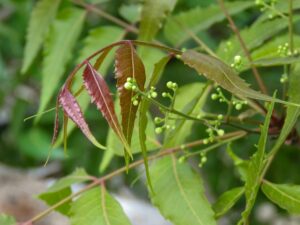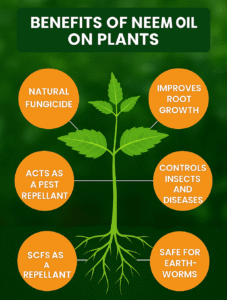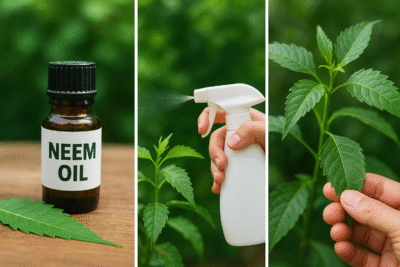Mosquitoes are more than just a nuisance in gardens. They disturb your time outdoors and spread harmful diseases. At the same time, our plants suffer from pests and fungal problems that reduce their health.
What if there was one natural solution to help with both? That is where neem oil mosquito repellent comes in.Neem oil has been used for centuries in India for its powerful healing, pest control, and protective properties.
WHAT IS NEEM OIL?
Neem oil is extracted from the seeds of the neem tree (Azadirachta indica), which grows widely in India and tropical regions.
The oil has a strong smell, bitter taste, and contains compounds like azadirachtin, which are responsible for its pest-repelling properties.
Unlike chemical pesticides, neem oil is biodegradable and safe for humans, pets, and beneficial insects like bees when used correctly. This makes it an excellent choice for eco-friendly gardeners.

NEEM OIL MOSQUITO REPELLENT
Mosquitoes dislike the strong odor of neem oil. When applied to the skin or sprayed in outdoor areas, it works as a natural repellent.
Studies have shown neem oil can protect against mosquito bites for several hours. In areas where mosquitoes are a major problem, mixing neem oil with coconut oil and applying to exposed skin is a traditional remedy.
For gardens, neem oil sprays help reduce mosquito presence when sprayed around damp areas, pots, and plants where mosquitoes usually breed.
HOW TO USE NEEM OIL FOR MOSQUITO CONTROL
Using neem oil as a repellent is simple and safe when done properly.
- For skin: Mix neem oil with coconut oil in equal parts. Apply lightly to exposed areas. Avoid direct use of concentrated neem oil on skin, as it may irritate.
- For outdoor spraying: Mix 2 teaspoons of neem oil with 1 liter of water and a few drops of liquid soap. Spray around standing water, damp corners, and garden plants.
- For candles or diffusers: Adding a few drops of neem oil to citronella candles or diffusers increases their mosquito-repelling effect.
This natural method not only reduces mosquito bites but also avoids the risks of chemical repellents.
NEEM OIL SPRAY FOR PLANT BENEFITS
Neem oil is widely used as an organic pesticide and fungicide in gardening. It protects plants from insects and fungal diseases without harming the environment.
INSECT CONTROL
Neem oil disrupts the life cycle of pests such as aphids, whiteflies, mealybugs, thrips, and caterpillars. It prevents them from feeding, growing, and reproducing.
FUNGAL CONTROL
It also helps in controlling fungal problems like powdery mildew, black spot, and rust. Regular spraying prevents spores from spreading across leaves and stems.
NUTRITIONAL BOOST
Though not a fertilizer, neem oil contains trace nutrients that can improve plant resilience and overall health.
HOW TO MAKE NEEM OIL SPRAY FOR PLANTS
Making neem oil spray at home is easy.
- Take 1 liter of warm water.
- Add 2 teaspoons of neem oil.
- Add 1 teaspoon of mild liquid soap.
- Mix well until the oil blends with water.
- Pour into a spray bottle and apply to leaves, stems, and soil.
Always spray in the early morning or late evening to avoid burning leaves under direct sunlight. Repeat once a week for prevention and twice a week if pests are visible.
BEST PRACTICES WHEN USING NEEM OIL
- Do not use concentrated neem oil directly on plants or skin. Always dilute.
- Test spray on a small section of the plant before applying widely.
- Reapply after heavy rainfall as neem oil washes away easily.
- Store neem oil in a cool, dark place as it loses strength in sunlight.
- Avoid spraying during midday to protect beneficial insects like bees.
HOW TO MAKE A PERFECT NEEM OIL SPRAY
- Take 1 liter of lukewarm water (helps blending).
- Add 1 teaspoon of mild liquid soap (unscented or natural is best).
- Stir well until soap dissolves.
- Add 2 teaspoons of pure neem oil slowly while stirring.
- Mix thoroughly. The spray should look milky and uniform.
IMPORTANT TIPS
- Always mix fresh before spraying. The solution loses strength if stored for more than 8 hours.
- Shake the bottle before each use, as neem particles may settle.
- Avoid chemical detergents, perfumes, or dish soaps with additives. They can harm plants.
- For extra sticking power, some gardeners add a tiny bit of aloe vera gel as a natural emulsifier.
Neem oil is not naturally soluble in water, which is why many beginners face problems when preparing sprays. If you just mix neem oil with water, the oil floats on top and does not spread evenly. This reduces effectiveness.
WHY NEEM OIL NEEDS AN EMULSIFIER
Neem oil is hydrophobic, meaning it repels water. To make a proper spray, we need an emulsifier (a substance that helps oil mix with water).
In gardening, a few drops of mild liquid soap works best. Soap molecules bind oil and water together, creating a smooth, uniform spray.
BENEFITS OF USING NEEM OIL IN THE GARDEN
Neem oil is highly valued by gardeners for many reasons.
- Safe for people and pets: Unlike harsh chemicals, neem oil does not leave toxic residues.
- Eco-friendly: It breaks down quickly in the environment.
- Multi-purpose: Works against both insects and fungi.
- Prevents mosquito breeding: Reduces standing water pests.
- Supports organic gardening: Approved for use in organic farming worldwide.

FAQs
1. Can neem oil kill mosquitoes completely?
No, neem oil does not kill mosquitoes completely. It works mainly as a repellent. Spraying reduces their presence, but breeding areas must also be controlled.
2. Is neem oil safe for all plants?
Yes, most plants tolerate neem oil well. However, some delicate plants with hairy or waxy leaves may be sensitive. Always test spray first.
3. Can I use neem oil on edible plants?
Yes, neem oil is safe for vegetables, fruits, and herbs. Just wash produce thoroughly before eating. Avoid spraying close to harvest time.
4. How often should I spray neem oil on plants?
For prevention, spray once a week. For active infestations, spray every three to four days until pests are controlled.
5. Does neem oil harm beneficial insects?
No, when used correctly neem oil does not harm bees, ladybugs, or butterflies. Spray in the evening when these insects are less active.
INTERESTING FACTS ABOUT NEEM OIL
- Neem oil has been used in India for more than 2000 years.
- It is called “the village pharmacy” due to its many uses.
- Neem oil is also used in shampoos, soaps, and toothpaste.
- Farmers use neem cakes (seed residue) as organic fertilizer.
- Neem oil is effective against more than 200 types of pests.
CONCLUSION
Neem oil is truly a gardener’s friend. It works as a natural mosquito repellent and as one of the best sprays for plant health. Safe, eco-friendly, and versatile, it supports both human comfort and garden care.
If you want a single natural solution to reduce mosquitoes and protect plants, neem oil is a smart choice. With regular use, your garden can stay healthy, green, and enjoyable without the risks of chemical sprays.
Thanks for reading. Keep growing, keep exploring, and don’t forget to return here at gardeningbud.com for more plants, tips and gardening wisdom.
